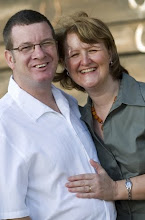
There was a popular worship song rendered by Ron Kenoly in the 1990s that included the question, “whose report will you believe?” with a corporate response, "we shall believe the report of the Lord!" I love the dated fashion and hairstyles, and the song itself, despite what I'm about to say.
This song takes (out of context) a Biblical story about poor majority leadership and applies it with individualistic references to being healed, filled with God's Spirit, free and living in God's victory. The song was a direct inference to the report returned to Moses by the spies who went to check-out Canaan on their trek out of Egypt. There were twelve – a representative from each tribe. Joshua and Caleb returned with a favourable, positive report. The other ten gave a doubtful, fearful and negative report.
Unfortunately, the ten people swayed the crowd and hundreds of thousands of people met their deaths in the desert as a direct result, forfeiting the promised land.
I have learned the power and impact of poisonous opinions from leadership upon the minds of otherwise neutral people in a team setting. Even if a person seeks to remain neutral, something small goes down deep inside, like a tasty morsel, “down to the innermost parts” (Proverbs 18:8; 26:22). The consequences are so serious that James describes the tongue like a small rudder that steers a massive ship, or like a spark that sets a forest ablaze (James 3:5). These days, such morsels are not necessarily vocal, but can be transmitted via electronic media too. Check out all the negative junk on You Tube against Christianity, and its multiple expressions. In fact, one part of Christianity seems to be at war with other parts. The words are out there and people listen to them, whether they are factual, moderately truthful, or not.
It’s like those court case dramas, where the attorney for the prosecution shouts “objection, your honour” to inadmissible information. The judge upholds the objection and instructs the clerk to erase the statement from the court record. In reality, it makes no difference. Once something is said, it is in the minds of the hearers. The groove has been cut. The prejudice is cast. The jurors will remember it and the matter will almost certainly be mentioned in their private deliberations, even though it was inadmissible evidence. It will affect their personal judgement.
Ron Kenoly’s song takes a simplistic approach to the decoding and circulation of negative communications. The truth is more complicated. The song suggests that our individual futures are determined entirely upon our personally chosen responses. The fact is, even if we host an individualistic philosophical perspective, we all live in various community settings, whether it is a church, a neighbourhood, organization or business. In the case of the nation, Israel, it didn’t matter what choice an individual made, the majority opinion overruled the perfect will of God, and the people got God’s decisive and disciplined alternative – becoming dust busters. This is not intended as a critique of praise and worship lyrics at all, but is a challenge to team leadership and its communications.
The majority opinion can turn the tide and move a barge-like movement off its original course and even turn it away from its planned destination. At the very best, it will produce a more tortuous journey and seriously delay the best outcome for the genuine individual; possibly at great cost to the Old Faithful on route. Can you imagine the sheer frustration Joshua and Caleb might have endured, waiting for forty years with a bunch of “losers” before their faith paid off? Character building? Yes! Redemptive? Yes! Was it the perfect will of God? I believe not! In a corporate sense, it is likely to have caused the organization to become isolated from its original position and anticipated impact. History shows that God can and does start new churches and organizations, with people who are more committed to fulfilling his perfect will. This can be seen in so many Christian “movements” throughout Church history, which are now “monuments” to great pasts. They continue to function with a proud heritage, but with a reduced current impact; operating at a lower ebb than the high water mark God intended them to reach.
Let us be careful therefore, not only whose report we believe, but which reports we circulate. Personal censorship of negative or dangerous news is an important and mature approach. In this day of “freedom of speech”, we might want to be more vigilant to discern unhealthy communications. Freedom of speech includes the freedom not to speak. There is a time to be silent. In the Second World War, there was a campaign against the disclosure of information that would make others vulnerable, including catch phrases like, “loose lips sink ships”. The BBC Newsbeat reports that the British Ministry of Defence (click links to see) has recently created a TV public warning "advertisement" to military personnel, their families and friends, to think carefully before uploading, blogging, tweeting, tagging or sharing on social media sites, because some information can put lives at risk unwittingly. We might want to be more careful, to screen communications that increase negative risk, and choose to communicate a positive message, so that the best purposes of God for His Church, and humanity generally, become a stronger likelihood. The alternative is not worth thinking about.
Prayer: God help me today to have faith in your good plans for my life and those around me. Give me a discerning heart, to screen out negative messages that contradict your good plans, for my own sake, and the good of those who walk alongside me.
.jpg)
No comments:
Post a Comment